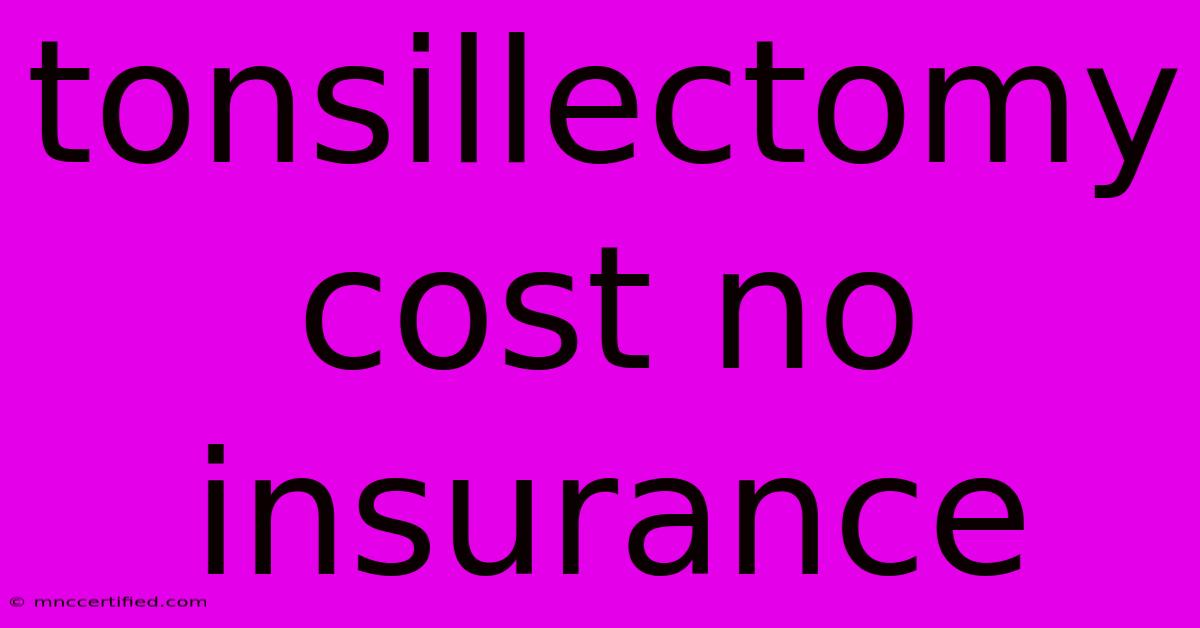Tonsillectomy Cost No Insurance

Table of Contents
Tonsillectomy Cost Without Insurance: A Comprehensive Guide
Having your tonsils removed, a procedure known as a tonsillectomy, can be a life-changing event, offering relief from chronic tonsillitis and sleep apnea. However, the financial aspect can be daunting, especially without health insurance. This guide explores the potential costs of a tonsillectomy without insurance coverage and provides strategies to manage the expenses.
Understanding the Variables Affecting Tonsillectomy Cost
The cost of a tonsillectomy without insurance varies significantly based on several factors:
- Hospital vs. Outpatient Surgery Center: Outpatient surgery centers generally offer lower costs than hospitals due to lower overhead. This is often a key factor in reducing the overall expense.
- Geographic Location: The cost of living and healthcare provider fees differ drastically depending on your location. Urban areas typically have higher costs than rural ones.
- Anesthesia Fees: Anesthesiologist fees are a significant part of the overall cost. The type of anesthesia used (general vs. local) can also affect the final price.
- Surgeon's Fees: The surgeon's experience and reputation will influence their fees. A more experienced surgeon might charge more.
- Post-Operative Care: This includes follow-up appointments, medication, and potential complications requiring additional treatment. These costs can add up quickly.
- Pre-Operative Tests: Blood tests, EKGs, and other pre-operative assessments add to the total cost.
Estimating the Cost: What to Expect
While precise figures are impossible without specifics, a tonsillectomy without insurance can range from $5,000 to $15,000 or more. This broad range highlights the impact of the variables discussed above. It's crucial to obtain detailed cost estimates from several providers before making a decision.
Breaking Down the Costs:
- Surgeon's Fee: This can be the largest single expense, potentially ranging from $2,000 to $6,000+.
- Anesthesia Fee: Expect to pay $1,000 to $3,000+.
- Facility Fee: The cost for using the hospital or surgery center can range from $1,000 to $5,000+ depending on location and facility type.
- Medication and Post-Operative Care: Factor in an additional $500 to $1,500+ for prescriptions and follow-up visits.
Strategies for Managing the Cost of a Tonsillectomy Without Insurance
Facing a high medical bill can be overwhelming. However, several strategies can help manage the costs:
- Negotiate with Providers: Many healthcare providers are willing to negotiate fees, especially for cash payments. Don't hesitate to ask for a discount.
- Payment Plans: Inquire about payment plans offered by the surgeon's office, the hospital or surgery center, or financing companies specializing in healthcare costs.
- Care Credit: CareCredit is a healthcare credit card that can help finance medical expenses. Be aware of interest rates and repayment terms.
- Crowdfunding: Platforms like GoFundMe allow you to share your story and seek financial assistance from friends, family, and the wider community.
- Medicaid or Other Public Assistance: If you meet the eligibility requirements, explore Medicaid or other government assistance programs.
- Free or Reduced-Cost Clinics: Check your local area for clinics offering services on a sliding scale based on income.
Finding Affordable Care: Resources and Next Steps
Navigating the complexities of healthcare costs without insurance can be challenging. Take these steps:
- Obtain Multiple Estimates: Contact several surgeons and facilities to compare prices and services.
- Ask Detailed Questions: Inquire about all associated costs, including anesthesia, facility fees, and post-operative care.
- Review Payment Options: Understand the available payment plans and financing options.
- Explore Financial Assistance Programs: Research local and national programs that may offer financial aid.
- Prioritize Your Health: While cost is a significant concern, remember the importance of your health. Make informed decisions based on both your financial and medical needs.
This information is intended for general knowledge and informational purposes only, and does not constitute medical advice. Always consult with a qualified healthcare professional for any health concerns or before making any decisions related to your health or treatment.

Thank you for visiting our website wich cover about Tonsillectomy Cost No Insurance. We hope the information provided has been useful to you. Feel free to contact us if you have any questions or need further assistance. See you next time and dont miss to bookmark.
Featured Posts
-
26 Year Old Khalid Publicly Gay
Nov 23, 2024
-
Livestream Psg Vs Toulouse Ligue 1 Soccer
Nov 23, 2024
-
Stop Ringworm Hair Loss One Key Step
Nov 23, 2024
-
Euro Millions And Thunderball Nov 22 2024
Nov 23, 2024
-
James Injury Latest Chelsea News
Nov 23, 2024